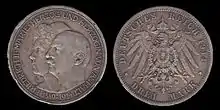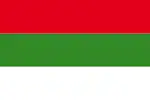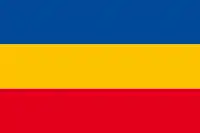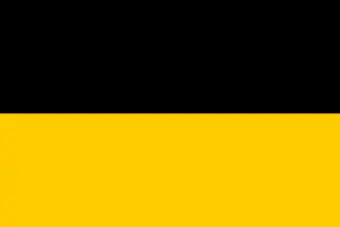| Frederick II | |||||
|---|---|---|---|---|---|
 | |||||
| Duke of Anhalt | |||||
| Reign | 24 January 1904 – 21 April 1918 | ||||
| Predecessor | Frederick I | ||||
| Successor | Eduard | ||||
| Born | 19 August 1856 Dessau, Duchy of Anhalt | ||||
| Died | 21 April 1918 (aged 61) Ballenstedt, Duchy of Anhalt | ||||
| Spouse | |||||
| |||||
| House | House of Ascania | ||||
| Father | Frederick I, Duke of Anhalt | ||||
| Mother | Princess Antoinette of Saxe-Altenburg | ||||
Frederick II (German: Leopold Friedrich II. Eduard Karl Alexander Herzog von Anhalt; 19 August 1856 – 21 April 1918) was the Duke of Anhalt from 1904 until 1918.
Early life
He was born in Dessau in 1856, he was the second son of Hereditary Prince Frederick of Anhalt-Dessau and his wife Princess Antoinette of Saxe-Altenburg.[1]
His father succeeded as Duke of Anhalt on 22 May 1871 and Frederick became heir apparent and Hereditary Prince following the death of his elder brother Leopold on 2 February 1886.
Marriage
Frederick was married on 2 July 1889 at Karlsruhe to Princess Marie of Baden (26 July 1865 – 29 November 1939). She was a daughter of Prince Wilhelm of Baden and his wife Princess Maria of Leuchtenberg, as well as an elder sister of Prince Maximilian of Baden, 8th Chancellor of Germany. The marriage produced no issue.[2]
Reign
On 24 January 1904, Frederick succeeded his father as Duke of Anhalt.[3]
During his reign he was known for his love of music and maintained a Court Theatre which became celebrated throughout Europe.[4]
He was Grand Master of the Order of Albert the Bear and a Knight of the Order of the Black Eagle. In 1914, during World War I, he instituted the Friedrich Cross as a decoration for merit in time of war.
He died at Ballenstedt Castle on 22 April 1918. As his marriage to Marie of Baden was without issue, he was succeeded as duke by his younger brother Eduard.
Honours and arms

| Coin of Frederick II of Anhalt, Struck 1914 | |
|---|---|
 | |
| Obverse: (German) FRIEDRICH II MARIE HERZOG UND HERZOGIN VON ANHALT, 1889-1914, in English: "Frederick II, Marie, Duke and Duchess of Anhalt, 1889-1914" | Reverse: (German) DEUTSCHES REICH, 1914, DREI MARK, in English: "The German Reich, 1914, Three Marks." |
- German orders and decorations[5]
 Anhalt:
Anhalt:
- Grand Cross of the Order of Albert the Bear, 1873;[6] Grand Master, 24 January 1904
- Founder of the Friedrich Cross, 1914
.svg.png.webp) Baden:[7]
Baden:[7]
- Knight of the House Order of Fidelity, 1889
- Knight of the Order of Berthold the First, 1889
.svg.png.webp) Bavaria: Knight of St. Hubert, in Diamonds, 1883[8]
Bavaria: Knight of St. Hubert, in Diamonds, 1883[8].svg.png.webp)
.svg.png.webp)
.svg.png.webp) Ernestine duchies: Grand Cross of the Saxe-Ernestine House Order
Ernestine duchies: Grand Cross of the Saxe-Ernestine House Order Mecklenburg: Grand Cross of the Wendish Crown, with Crown in Ore, 17 April 1877[9]
Mecklenburg: Grand Cross of the Wendish Crown, with Crown in Ore, 17 April 1877[9].svg.png.webp) Prussia:
Prussia:
- Knight of the Red Eagle, 1st Class
- Knight of Honour of the Johanniter Order
 Hohenzollern: Cross of Honour of the Princely House Order of Hohenzollern, 1st Class
Hohenzollern: Cross of Honour of the Princely House Order of Hohenzollern, 1st Class Württemberg: Grand Cross of the Württemberg Crown, 1889[10]
Württemberg: Grand Cross of the Württemberg Crown, 1889[10]
- Foreign orders and decorations[5]

.svg.png.webp) Austria-Hungary: Grand Cross of the Royal Hungarian Order of St. Stephen, 1908[11]
Austria-Hungary: Grand Cross of the Royal Hungarian Order of St. Stephen, 1908[11] Denmark: Knight of the Elephant, 14 July 1902[12]
Denmark: Knight of the Elephant, 14 July 1902[12].svg.png.webp) Kingdom of Greece: Grand Cross of the Redeemer
Kingdom of Greece: Grand Cross of the Redeemer.svg.png.webp) Ottoman Empire: Order of Osmanieh, 1st Class
Ottoman Empire: Order of Osmanieh, 1st Class Kingdom of Romania: Grand Cross of the Star of Romania
Kingdom of Romania: Grand Cross of the Star of Romania.svg.png.webp) Kingdom of Serbia: Grand Cross of the Cross of Takovo
Kingdom of Serbia: Grand Cross of the Cross of Takovo
Ancestry
| Ancestors of Friedrich II, Duke of Anhalt |
|---|
References
- ↑ Almanach de Gotha. 1858. p. 3.
- ↑ Almanach de Gotha. 1910. p. 2.
- ↑ "Duke of Anhalt is dead". New York Times. 1904-01-25. p. 7.
- ↑ "Music-Loving Duke dead". New York Times. 1918-04-23. p. 13.
- 1 2 Hof- und Staats-Handbuch des Herzogtum Anhalt (1894) "Genealogie des Herzoglichen Hauses" pp. 3-4
- ↑ Hof- und Staats-Handbuch des Herzogtum Anhalt (1894) "Herzoglicher Haus-orden Albrecht des Bären" p. 15
- ↑ Hof- und Staats-Handbuch des Großherzogtum Baden (1896), "Großherzogliche Orden" pp. 63, 77
- ↑ Hof- und Staats-Handbuch des Königreichs Bayern (1906), "Königliche Orden" p. 7
- ↑ "Großherzogliche Orden und Ehrenzeichen". Hof- und Staatshandbuch des Großherzogtums Mecklenburg-Strelitz: 1878 (in German). Neustrelitz: Druck und Debit der Buchdruckerei von G. F. Spalding und Sohn. 1878. p. 11.
- ↑ Hof- und Staats-Handbuch des Königreich Württemberg (1896), "Königliche Orden" p. 28
- ↑ "Ritter-Orden", Hof- und Staatshandbuch der Österreichisch-Ungarischen Monarchie, 1918, p. 56, retrieved 2 November 2019
- ↑ Jørgen Pedersen (2009). Riddere af Elefantordenen, 1559–2009 (in Danish). Syddansk Universitetsforlag. p. 463. ISBN 978-87-7674-434-2.